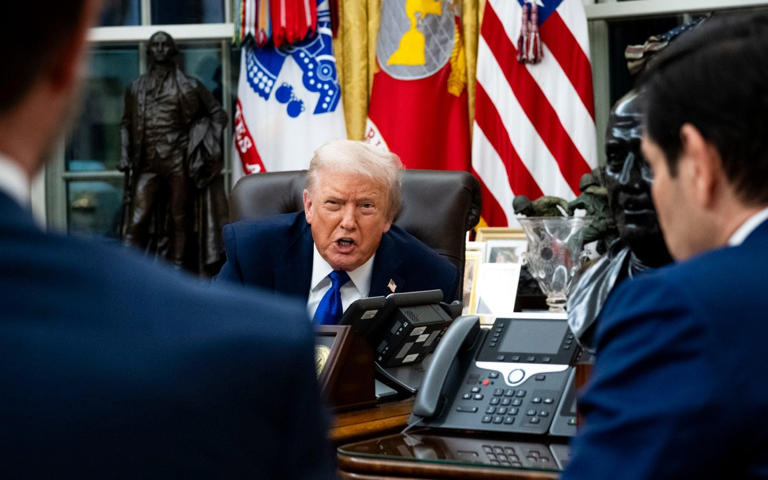Donald Trump said his power as commander-in-chief was constrained only by his “own morality.”
Days after he sent special forces to snatch the leader of a sovereign nation, he was asked whether there was any limit to what he could do.
“Yeah, there is one thing,” he told The New York Times in an Oval Office interview. “My own morality. My own mind. It’s the only thing that can stop me.”
On Saturday, his troops captured Nicolas Maduro, the president of Venezuela, to face trial in New York.
It triggered a slew of questions about whether he had broken international law. And even close allies, such as Sir Keir Starmer, said the Trump administration had a duty to set out its legal case for using force.
The operation was the latest example of Mr Trump’s muscular approach to the world and the way he feels free to use any instrument of power, from tariffs to drones, in the pursuit of American interests.
In so doing, he has upended the rules-based order that has governed international affairs since the Second World War.
“I don’t need international law,” Mr Trump said. “I’m not looking to hurt people.”
It was just one remarkable moment in a series of extraordinary episodes inside the Oval Office on Wednesday.
The reporters conducting the interview were allowed to listen in on the president’s conversation with Gustavo Petro, the president of Colombia.
When JD Vance, the vice president, and Marco Rubio, secretary of state, stopped by for the call, they revealed how Mr Trump had given them four pairs of dress shoes each.
And throughout the interview, the president relied on Natalia Harp, an aide he nicknames “AI”, to search for things on the internet and print documents.
When aides passed the president a note telling him that Mr Petro was on the line, the four New York Times reporters paused their interview.
But rather than being escorted out, they were allowed to stay for the hour-long speaker phone conversation.
Mr Trump has previously called the Colombian president an “illegal drug leader” and a “sick man”, warning that he could be “next” after Venezuela’s leader Nicolás Maduro was seized from his home in Caracas.
Mr Petro has said Mr Trump “deserves nothing but jail” and that he would personally take up arms to defend his country from the US.
Instead of sending the journalists away for the high-stakes conversation, Mr Trump invited them to stay, warning that the contents of the call were off the record. He then carried on with the interview once the call was finished.
Mr Vance and Mr Rubio also joined the discussion with Mr Petro, but both men left the room once the call was concluded.
Mr Trump later posted on social media that it was a “great honour” to speak to Mr Petro “who called to explain the situation of drugs and other disagreements that we have had”, adding that he had invited him to the White House.
The unorthodox move of allowing journalists to be privy to private conversations between world leaders raises concerns about national security.
But The New York Times may have found favour with the Trump administration after it refused to publish details of the US raid on Mr Maduro, despite finding out about it ahead of time.
They delayed reporting about it after administration officials warned it could endanger US troops, according to multiple reports. That decision probably saved American lives, Mr Rubio said.
Several days later, White House correspondents Zolan Kanno-Youngs, Tyler Pager, Katie Rogers and David E Sanger secured a two-hour interview with Mr Trump.
A photograph shows them huddled around the president’s Resolute Desk, with Karoline Leavitt, his press secretary, and Steven Cheung, his communications director, sitting nearby.
They discussed the US strategy towards Venezuela, the Russia-Ukraine war, Greenland and Nato, the president’s health and his plans for further White House renovations.
Mr Trump revealed that he expected the US to be running Venezuela and tapping into its oil reserves for years. Asked if it would be longer than a year, he said: “I would say much longer,” but refused to offer a timeframe.
However, the new leadership in Caracas has insisted otherwise, setting it on a potential collision course with the White House.
After US special forces had snatched Mr Maduro and his wife on Saturday and flown them to New York to face trial on charges of narco-terrorism, Mr Trump declared that he would “run” Venezuela.
Delcy Rodriguez, the interim president and Mr Maduro’s former right-hand woman, said on Wednesday that no foreign power would govern the country, adding: “The government of Venezuela is in charge in our country, and no one else.”
She called the US attack to depose her predecessor, which Venezuelan officials say killed one hundred people, “a stain on our relations such as had never occurred in our history”.
However, Mr Trump said the interim government, all former Maduro loyalists, was “giving us everything that we feel is necessary”.
Ms Leavitt told reporters on Wednesday that the US had “maximum leverage” on the interim government, whose decisions would “continue to be dictated by the United States”.
Trump administration officials have said that Washington will control the beleaguered South American country’s oil sales “indefinitely” to stabilise the economy and ensure it acts within US interests.
However, with few details of the plan released, Mr Rubio has insisted Washington is “not just winging it” after White House insiders told The Telegraph that Mr Trump had no blueprint for what comes next.
Washington moved to further enforce its authority on Venezuela when it seized two sanctioned oil tankers that had defied its blockade, including a Russia-linked vessel it pursued to the European waters.
Moscow condemned the operation, but the White House and the UK – which took part in it – said the oil tanker was “stateless” after flying a false Russian flag. By Story by






